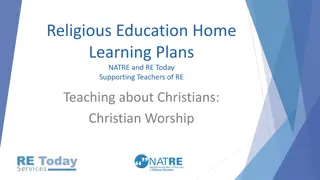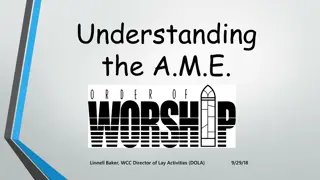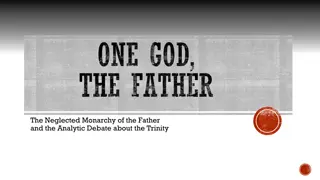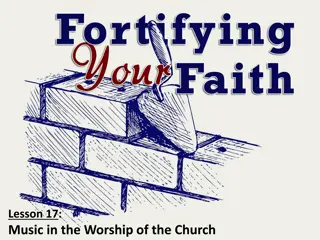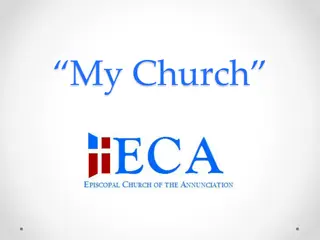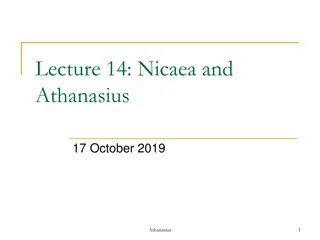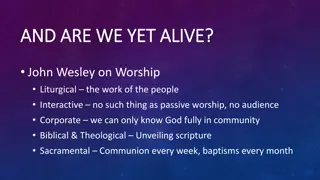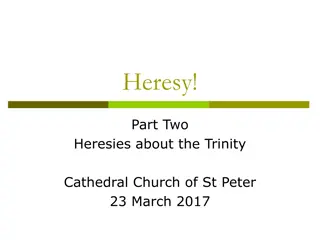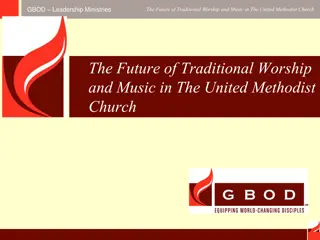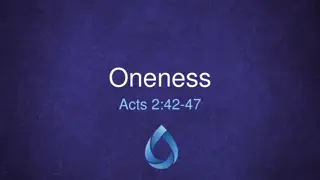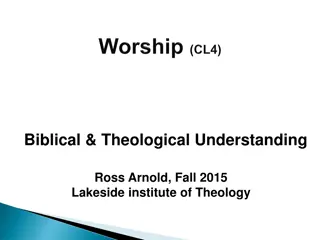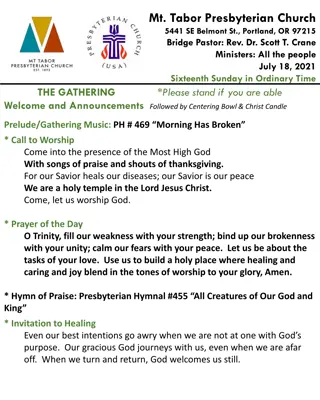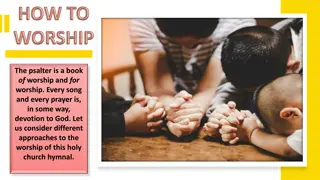Exploring Trinitarian Worship for Mission and Unity
Delve into the rich dialogue surrounding Trinitarian worship and its link to mission, as discussed by Coenie Burger and J.B. Torrance. Discover the significance of maintaining a Trinitarian perspective in Christian worship, highlighting the importance of true participation through the Spirit in communion with the Father and the Son.
Download Presentation

Please find below an Image/Link to download the presentation.
The content on the website is provided AS IS for your information and personal use only. It may not be sold, licensed, or shared on other websites without obtaining consent from the author. Download presentation by click this link. If you encounter any issues during the download, it is possible that the publisher has removed the file from their server.
E N D
Presentation Transcript
Trinitarian Worship Coenie Burger
Worship and Mission Aim of conference to bring themes of mission and worship in conversation with one another Danger? Two themes can be in tension or even opposition . Why we need a close connection: good energy for mission can only come from right worship Believe the Conversation on Trinity can help us Has been a lively conversation on Trinity past 50 years Acknowledged in Missio Dei discussion Also new interest in implications of Trinitarian Faith for worship (Torrances, Wainwright, Witvliet) Primary focus here on Trinitarian Worship
What are the issues behind this conversation? There are obvious and important theological issues behind this conversation (eg identity of the Christian God, how we think about God, what is true worship, what is the essence of worship) But also very real practical life issues: how people experience worship services: Dutch member: Christian faith still makes sense; not the church and worship Many people not inspired, helped Not much impetus for mission?
J B Torrances perspective on Trinitarian Worship Primary problem of the church and worship: no longer Trinitarian, but Unitarian! Unitarian? Do not take Bible story and especially Christ seriously; deistic or moralistic or pantheistic understanding of God; God no longer a living, acting God; we are the acting agents in worship not God! True Trinitarian Worship: Pray to Father, through Christ, in the Spirit Christ our worship leader (Hebr 8:2); He is the only One who can bring true and acceptable worship to God Our worship? We are invited to join Christ in his worship in Spirit So God the primary acting person in worship; we respond through the power of Spirit Interesting research by Jungmann and T F Torrance (Unintended consequences of Nicea)
JB Torrance on Christian Worship: Christian Worship is, therefore, our participation through the Spirit in the Son s communion with the Father, in his vicarious life of worship and intercession. We must ask ourselves whether our forms of worship conveys this Gospel. Do they help people to apprehend the worship and ministry of Christ as He draws us by the Spirit into a life of shared communion, or do they hinder . Do they make the real presence of Christ transparent in worship or do they obscure it?
Different discourses on the Trinity and their consequences for our theology and worship (combining Witvliet and Migliori) 1. In the Image of God: Divine and Human Relationality (Perichoresis) 2. Divine Mediation: God s real Presence and Agency (vs Deism) 3. A Personal God: God s life is personal life in relationship 4. Divine Economy: We believe God is Father, Son and Spirit 5. Balance and Integration: attention to the Three and the One! 6. God is self-giving, other-regarding, community-forming love
1. Imago Trinitatis: Divine and Human Relationality If being in relationships is central to God s life it must be vital and for created human life as well (Zizioulas: Being as Communion) Point of perichoresis (also Early Church, Hurtado) Migliori: other-regarding, community-forming love WCC: focus on koinonia Difference between Barth (unipersonal) and Moltmann (tripersonal): both agree that human life with God is about a relationship Obvious implications for ecclesiology and anthropology
Relationality: Implications for worship Focus not only on truth and information but on people and relations Hurtado: focus on sharing koinonia Ecumenical awareness (space for others) Kiefert: welcoming, hospitality vital (also Mike Harrison) Awareness, space for children.. Passing the peace Sacraments Architecture! Leadership in congregations and in worship service (more communal)
2. Divine Mediation: God s real presence and agency Critical issue: vs deism who denies God s active presence and action in history (vgl Keifert: what is God doing?) Torrance and others convinced that this is widespread in First World Christianity: God reduced to doctrine, worldview, morals, spirituality, human potential Contra: God of the Bible is a Living God (Calvin ala Smit) who acts in history and is really present with us JB Torrance about active Priesthood of Christ CWB about Christ s presence with us after his ascension Important second question: how do we understand God s agency in history (cf new book by Rowan Williams)
Divine Mediation: Implications for Worship Worship is a gift: our orientation one of expectation and receiving Help people to be aware of real presence of God (beginning of service, symbols, interior) Role of worship leader to help people sense the presence of God Prophetic preaching (imagination) helping us to see where God is working Expectation, longing for God and his action voiced in prayers, singing
3. A Personal God: God s life is personal life in relationship Vital Point of discussion in Theology and Faith: more people who see themselves as adhering to Christianity, but do not think about God in personal terms. Important to note that many respected theologians/philosophers resist this development (Calvin, Barth, Migliori, Plantinga, Wolterstorf) Find strong support in Trinitarian Theology. Migliori: Scripture clearly talks about God in Personal Terms; God loves us, knows us, wants a relationship with us. Worship service should foster our relationship with Christ: both union with God through Christ and discipleship Our relationship with God is personal but not exclusive or individualistic (Our Father)
Gods life is personal: Implications for Worship Worship service as a meeting (encounter) between God and us. Wolterstorff: God talking and listening to us! Attention to Bible Story: God s love and concern for us (and all people) Baptism (You are my children in whom I have delight ) Lord s Supper More time for renewal of our confession and witness-giving in Church
4. Divine Economy: We believe God is Father, Son and Spirit Issue about God s true identity: which God do mean when we say God? (vs Eisenhower: had a vague faith to which he held very strongly) Barth and Rahner: the economic Trinity is the immanent real Trinity cannot go back, higher, deeper than revelation in Christ Accept revelation of Scripture: God is like God revealed Godself in Bible (vs option of philosophy Migliori) H Berkhof: God more than his revelation but not different Strong focus on Christ (Joh 14:6; TFT story about soldier)
Divine Economy: Implications for Worship Strong focus on Bible, esp NT story of Christ; preaching Importance of Lord s Supper (point of worship is that we should grow into the story of Christ) Apostles Creed: Trinitarian in Structure Attention to liturgical year Trinitarian invocation and benedictions (beginning and end of service)
5. Balance and Integration: attention to the Three and the One!5. Important correction for Western Church: stronger emphasis on the reality of the Three Persons in God Often not possible to answer deep questions of life and faith in one word: have to use three words . Because God is present and acting in most life-situations in more than one way (often three ways .?) Danger of one-sidedness (cf Niebuhr about history of the church) Must not slip into Tritheism should not lose the One-ness of God (even bigger problems if we do that!)
Balance and Integration: Implications for Worship Remember the Trinitarian Structure and Flow of Worship (From the Father through Christ in the Spirit; to the Father through Christ in the Spirit) and help congregation to think along those lines Attention to detail of Bible stories and language Attention to Trinitarian beginning and end of service
6. Attributes: God is self-giving, other- regarding, community-forming love Core of the Gospel: God is love (Joh 3:16, Matt 22:35) the mind must grasp it, but even more important: the heart must feel it and the will must be moved by it. Tom Wright: The Gospel is not a power story but a love story God s love defined by the self-giving, other-regarding love of Christ (Gorman: Phil 2:1-11 central for our understanding of Christ) Christ s incarnation invites us to move with him into the struggles, pain and chaos of others around us Migliori adds: the life of God is essentially self-giving love whose strength embraces vulnerability Don Saliers: real worship happens when God s ethos embraces human pathos
Self-giving God: Implications for worship Vital for the Missional Connection in the Worship Service! Must be space for peoples humanity and brokenness in the worship service Disruption and pain must be voiced in hymn, prayers and scripture reading and sermon Must help people to understand the power of love Halverson Benediction: Wherever you go, God is sending you; wherever you are, God has put you there; God has a purpose in your being there. Christ who indwells you has something He wants to do through you where you are. Believe this and go in His grace and love and power. Amen!
Different discourses on the Trinity and their consequences for our theology and worship Witvliet Imago Trinitatis (Trinity is about life in community) Divine Mediation (the Primacy of God s real presence and agency) The Divine Economy (How the Bible speaks about the identity of God) Balance and Intergration (taking the Three and the One seriously) Redefinitions: five images of God and his key attributes Personal Relational Agential Self-giving speaking
Migliore about the Trinity Must not lose the depth grammar: God is self-expending, other-regarding, community-forming love Add three points: Trinitarian Theology affirms that the eternal life of God is personal life in relationship affirms that God exists in communion far deeper than the relationships and partnerships we know in our human experience affirms that the life of God is essentially self-giving love whose strength embraces vulnerability





